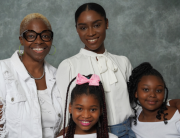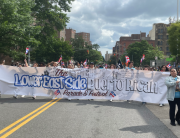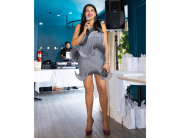In this second part of our sit-down with Dr. Arabia Mollette (see part one here), she shared with us five easy steps we can take to becoming healthier in our everyday life and how city living is affecting our wellbeing.
Dr. Arabia Mollette is the personification of tragedy to triumph. Sitting across from this confident, charismatic emergency physician, you wouldn’t know that she experienced the traumatic deaths of her infant son and her sister; endured homelessness, poverty, domestic violence, and detractors who told her she would never amount to anything more than a teenage mother. Dr. Arabia Mollette took all that pain, tragedy and criticism and began a career serving people who have experienced much of the same. Chatting with my fellow South Bronx-native, it’s easy to imagine that she’s probably the most popular E.R. physician at her Brooklyn hospital. Her relatable and caring, yet firm and informed presence reminds you of the girlfriend you’d always want in your corner. We asked Dr. Mollette her take on a variety of topics and she answered.
From City Living to Emergency Room
In terms of our community…I definitely see a lot of psychiatric disorders, hypertensive emergencies—that includes strokes, includes having a heart attack, a black woman that’s pregnant and coming in the emergency with hypertension- that’s called preeclampsia, and if she’s developed a seizure, then it’s called eclampsia—asthma, severe respiratory diseases…When you live in New York City or any inner city, where people are living on top of each other, or poor infrastructure, that does affect the respiratory system…There’s environmental pollution and environmental racism. Look at the Bronx, for example—the Bronx has the highest pediatric asthmatic deaths in the United States. As a matter of fact, the Bronx is one of the poorest U.S. Congressional districts in the nation, after Alabama and Louisiana. Environmental racism has a lot to do with it, and it’s not being addressed. When you have children that are living in shelters, particularly in the South Bronx, where radiators are exploding, when you still have slumlords that are not providing adequate heat in a number of homes—so, the other cases I see in the emergency department are hypothermia; people are freezing, almost to death. And I’ve treated so many cases of hypothermia during the wintertime because people are utilizing their stove or their oven to heat their apartment, but because of carbon monoxide poisoning, people get scared, so they are found with very low temperatures. And this is a crisis.
5 Steps to Health
We need to be more open and talk about our traumas. The first places we tend to resort to, in terms of talking about our trauma, is our churches, or any religious institution, our family and our friends. But that’s not enough. You need a professional therapist or someone that can help you, [someone] that is culturally competent and sensitive to help you get through those moments so you can learn better coping life skills, and that way you can feel like you’re not alone. That’s first and foremost in terms of lifestyle, and health and wellness—understand and acknowledge that if you have an issue, you have an issue. Don’t feel ashamed about it, embrace it, understand where you’re at right now and know that there’s help.
The second thing I would say is sleep. I’m not into #teamnosleep. And the reason is, if I get at least 8 hours of sleep you best believe I can grind throughout the rest of day. Because I’m more productive, I’m happier, I wake up, I’m rested, my brain had already detoxified all the toxins while I was sleep; allowed me to dream. So, I am a big advocate of people to sleep.
Three—Love the people that love you. Allow them to help you along the way; be flexible. The people who have been riding with me thus far have tolerated my mess. Why would I not love them? Why would I not say thank you? Why would I not say I love you? Why would I not send a text; “Hey, good morning. Everything is good? Everything is alright? I don’t need anything from you, I just need to know you’re ok”
The fourth thing I would do is take a walk. If you like to exercise, you like to exercise, if you don’t, you don’t. I hate exercising. I still go to the gym and spin.
The last thing—actually, it’s kind of combined—I do not bring work home. As a physician, we have a number of charts that we have to sign and make sure they’re submitted to the hospital, and we can have access from home—but why would I make my home into another environment that is already toxic and very stressful? And a lot of times in the morning, I get up, I pray, I say a little mantra to myself, “I am black. I am proud. I am proud of people. I am proud of my accomplishments. No matter what, at the end of the day I am more than enough”. If no one else can’t pat you on the back, you have to find ways to pat yourself on the back. Never seek validation from others, seek it from yourself. It’s nice that people tell you good things but understand that there’s a balance to it.
You can find out more about Dr. Arabia Mollette, here and listen to her podcast, “The Visit with Dr. Arabia Mollette” on Soundcloud, Spotify, and iTunes.
Featured Image by Whitney Thomas







Add Comment
You must be logged in to post a comment.